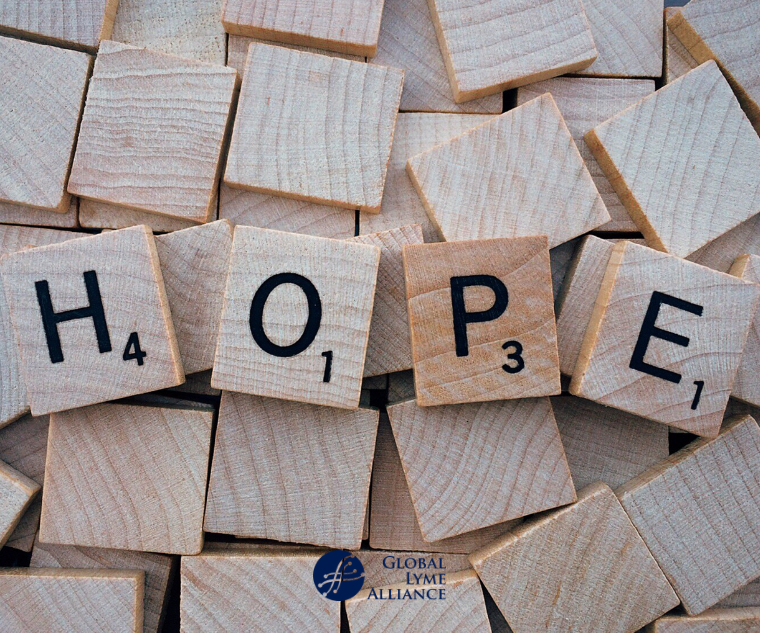
Struggling with the idea of hope when you have Lyme disease? Read on
Hope is a tricky concept for patients with chronic illnesses. It is something everyone—healthy or sick—wants, but summoning hope is not always easy when the world around you looks bleak. Someone can say to you, “I hope you feel better soon,” and you know they mean it. But when your path towards health seems to move one step forward and then three steps back, it’s hard to have hope that things will ever improve.
I know this struggle, because I wrestled with it at my lowest points of illness. When I was not yet diagnosed with Lyme and two of its tick-borne co-infections— babesia, and ehrlichia—I was in bed with flu-like symptoms for two years. I did get a kind of half accurate diagnosis of chronic Epstein-Barr virus, but close is not good enough in medicine.
I tried acupuncture, integrative manual therapy, Chinese herbs, a specialized diet, and talk therapy. But my symptoms did not improve. Instead, they increased; I developed insomnia, hallucinogenic nightmares, and migraines. In the beginning of those two years, I held out hope that a combination of rest and adjunct therapies would make me well again. I hoped I would get back to the life I had left behind.
But as time wore on and my health deteriorated, I exhausted my personal resolve. “I’m never going to get better,” I wailed to a friend on the phone one day. “What if I feel like this for the rest of my life?”
This particular friend had suffered a traumatic brain injury years earlier after falling off a cliff on a bike. Air lifted to safety, she’d barely survived, and doctors told her she’d never regain her full cognitive capacities.
She proved them wrong. She still has symptoms she has to monitor, but now, she travels all over the world doing international development work. She’s married and is raising a beautiful six-year-old daughter. She’s athletic and independent. She had to learn to walk, talk, and think again after her accident. For awhile, doctors had thought her best hope would be a vegetative lifestyle. Instead, she is now thriving. Her hard work and determination made her well, but that didn’t mean she always had hope.
So instead of telling me, “You have to hold out hope!” like so many well-meaning people did when I worried I’d never get well, my friend said to me, “It’s okay to feel hopeless right now. I’ll do the hoping for you.”
I remember how my body and heart relaxed when I heard those words. I’d been given permission to have “negative” feelings. This kind act took away some of the pressure I felt to always have a positive attitude, even when I was too sick to smile. But not only was my friend letting me off the hook from that pressure, she was also saying I didn’t have to worry about summoning hope when I was unable to do so, because she’d take care of that task for me. It’s no different, really, than praying for another person. You can still send them your best of intentions, even when they can’t produce those sentiments themselves. A person without hope can still be hoped for.
Sometimes, too, it’s enough just to have even a vague idea of hope. One of my creative writing students, who struggles with depression, wrote about how frustrating it can be when people tell her to be hopeful. She says she would like to be if she could, but the depression often blocks her.. On days when that cloud of depression is slightly less oppressive, however, she can think about the idea of hope. She can’t necessarily summon hope for her particular situation, but she can recognize that the idea of is out there somewhere. Just hoping to someday regain hope, she says, is enough for her.
When you’re that sick, hoping for hope can feel more attainable than hope itself. Just start with that small step.
And if you can’t even imagine the idea of hope, hold on, and know that others are holding out hope for you. I lost hope completely, but let others surround me with it while I put all my focus into getting well, and I got healthier than I ever dreamed I could. You can, too.
I am hoping for the best for you.
The above material is provided for information purposes only. The material (a) is not nor should be considered, or used as a substitute for, medical advice, diagnosis, or treatment, nor (b) does it necessarily represent endorsement by or an official position of Global Lyme Alliance, Inc. or any of its directors, officers, advisors or volunteers. Advice on the testing, treatment or care of an individual patient should be obtained through consultation with a physician who has examined that patient or is familiar with that patient’s medical history.

Jennifer Crystal
Writer
Opinions expressed by contributors are their own. Jennifer Crystal is a writer and educator in Boston. Her work has appeared in local and national publications including Harvard Health Publishing and The Boston Globe. As a GLA columnist for over a decade, her work on GLA.org has received mention in publications such as The New Yorker, weatherchannel.com, CQ Researcher, and ProHealth.com. Jennifer is a patient advocate who has dealt with chronic illness, including Lyme and other tick-borne infections. Her memoir, One Tick Stopped the Clock, was published by Legacy Book Press in 2024. Ten percent of proceeds from the book will go to Global Lyme Alliance. Contact her via email below.




-2.jpg)

